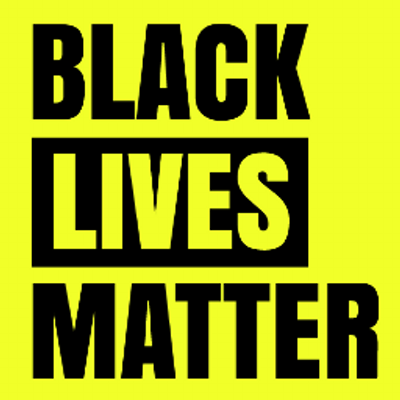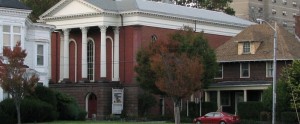 On Sunday, March 20, at 11:30 am, The First Unitarian Church of Providence will hang a banner affirming that “Black Lives Matter” over its Benevolent St. entrance (just above the intersection with Benefit St.). It is an act of public witness to which all are welcome.
On Sunday, March 20, at 11:30 am, The First Unitarian Church of Providence will hang a banner affirming that “Black Lives Matter” over its Benevolent St. entrance (just above the intersection with Benefit St.). It is an act of public witness to which all are welcome.
First Unitarian’s interim minister, Rev. Charles Blustein Ortman, will briefly dedicate the banner, after which those present will be welcomed into the church’s Parish House for drinks and light snacks.
The church is hanging the banner this month to mark the occasion in March 1965 when hundreds of nonviolent civil-rights activists, led by Martin Luther King, Jr., began a five-day march from Selma, Alabama, to the state capitol in Montgomery to demand voting rights for African Americans.
Starting at 12:30 pm, First Unitarian will show the 2015 film Selma, which depicts the tumultuous events that led to enactment of the federal Voting Rights Act on August 6, 1965.
A congregational vote was taken to affirm that Black Lives Matter; hanging the banner represents the first step in a campaign through which the church will pursue racial justice in Providence, in Rhode Island, and in the US.
“We are acting in the face of overwhelming evidence that Black people and other people of color are disproportionately harmed and discriminated against by our systems of criminal justice, health care, finance, housing, education and employment,” says Reverend Ortman.
“We are also moved to act by our shared agreement,” he says, “which compels Universalists to walk together in search of the paths of wisdom, compassion and justice.”
Under the auspices of its Standing on the Side of Love committee, First Unitarian will identify activities in which its members – joined, it hopes, by members of the broader community – can engage to advance this campaign. Such activities could include participating in voter-registration drives, supporting (or opposing) legislation, attending rallies, organizing events to raise awareness and screening relevant films.
First Unitarian’s support for the Black Lives Matter movement is in keeping with its long history of standing up for social justice. Most recently, the congregation devoted five long years to bringing marriage equality to Rhode Island, which arrived in May 2013.
[From a press release]
]]> Sally Gabb connects the profound and mundane. More than simple opposites, Gabb asks us to consider the spaces in between.
Sally Gabb connects the profound and mundane. More than simple opposites, Gabb asks us to consider the spaces in between.
Do I usually look at snow in a spiritual way? Of course not. When snow arrives I have a variety of emotions: it will be pretty, but it means winter is really here. Snow will be a monstrous pain in the you know what to get out of the driveway, to get to work. Winter means cold and darkness, so while snow can be lovely, after the first experience each year I say – that’s enough!
Of course, like spirituality, we all experience weather differently. For the child it means snow men and snow angels. For the skier, snow is a blessing – it means the potential for enjoyment outdoors. For the gardener and the farmer, snow provides a protective cover for plants, and a source of much needed moisture. But all of us in New England have a relationship to snow.
We might ask, why are sunshine, light and warmth positive metaphors, including those we use in our spiritual lives? Science tells us that light – our source the sun – provides our world with energy needed to sustain life. Most of us see light as a positive force, and all spiritual traditions refer to light – to enlightenment. Because we constantly experience weather – dark and light, cold and warm, storm and calm – it is inevitable that we will create metaphors for our emotional and spiritual lives.
Actually, while I have just talked about weather conditions as opposites, weather can enable us to move away from these opposing dualities. We talk of days that are partly cloudy – a transition from sun to storm. We all relate to sunrise and dusk –the transition times between dark and light. We know that weather temperature doesn’t move directly from warm to cold, but has a period of change.
There are spiritual traditions that emphasize dualities: heaven and hell, good and evil… we prefer to see a more complex picture that reflects the complicated nature of our relationship. This non – dualistic approach was a major aspect of transcendentalism embraced by Emerson and Thoreau.
See the unity of spiritual experience across all faiths. See not the day versus night, storm versus calm, but the unifying experience of being alive…
]]> Theodore Parker, an abolitionist, feminist and radical Unitarian preacher in Boston in the 1840s, wrote a famous (and for its time) controversial sermon, “A Discourse on the Transient and Permanent in Christianity.” Basically, he argued that even if Jesus was not found to not be divine, his ethical precepts – “Do unto others as you would have them do unto you” – are true, worthy guideposts for a healthy, balanced, justice seeking life.
Theodore Parker, an abolitionist, feminist and radical Unitarian preacher in Boston in the 1840s, wrote a famous (and for its time) controversial sermon, “A Discourse on the Transient and Permanent in Christianity.” Basically, he argued that even if Jesus was not found to not be divine, his ethical precepts – “Do unto others as you would have them do unto you” – are true, worthy guideposts for a healthy, balanced, justice seeking life.
The discussion over what is dust in the wind (transient) and a given of humanity (permanent) has been ongoing in many faith traditions. Among Unitarians and Universalists, member congregations have tried to create a big-umbrella of beliefs – a common set of ethics, and multiple ways of arriving at those ethics. Yet, even our most agreed upon common principles adapt over time, based on democratic input and reflection.
Unitarians were once a persecuted group in Eastern Europe, and Universalists turned traditional Calvinism on its head- saying God so loved the world, none would forever burn in heaven. Unitarians came to be found in New England, India, the Midwest, Jamaica, the United Kingdom, and Hungary, among other places. Universalists spread from New Jersey across the US, eventually partnering with churches in Japan.
In 1961, Unitarian and Universalist congregations in the US and Canada promised to unite in seeking …
1. To strengthen one another in a free and disciplined search for truth as the foundation of our religious fellowship;
2. To cherish and spread the universal truths taught by the great prophets and teachers of humanity in every age and tradition, immemorially summarized in the Judeo-Christian heritage as love to God and love to man;
3. To affirm, defend and promote the supreme worth of every human personality, the dignity of man, and the use of the democratic method in human relationships;
4. To implement our vision of one world by striving for a world community founded on ideals of brotherhood, justice and peace;
5. To serve the needs of member churches and fellowships, to organize new churches and fellowships, and to extend and strengthen liberal religion;
6. To encourage cooperation with men of good will in every land.
As of the latest revisions, Unitarian and Universalists congregations affirm the following principles …
1.The inherent worth and dignity of every person;
2. Justice, equity and compassion in human relations;
3. Acceptance of one another and encouragement to spiritual growth in our congregations;
4. A free and responsible search for truth and meaning;
5. The right of conscience and the use of the democratic process within our congregations and in society at large;
6. The goal of world community with peace, liberty, and justice for all;
7. Respect for the interdependent web of all existence of which we are a part.
Reflecting on what is transient and permanent can help us to consider what to hold on to, and what to let go, in our daily struggle to live and be together in community.
]]>Struggling With the First Principle
 I told a friend I was working on the difficulty of living the First Principle. I had no sooner said, “the inherent worth and dignity of every person” than she cut me off and said, “That’s not true.” Further discussion was out of the question. My friend is a socially-engaged and liberal Jew. For her, our First Principle is not just preposterous, it is wrong. To her, people obviously do not all have the same inherent worth and dignity. She thinks we’re mad. Well, then, what are these Principles? Are they ideals, abstractions, unreal sentimental aspirations, untrue? Are they to be honored in the abstract and denied in the concrete? Do people have inherent worth and dignity? Like my friend, you don’t have to believe that. These are Principles, but they are neither dogma nor creed.
I told a friend I was working on the difficulty of living the First Principle. I had no sooner said, “the inherent worth and dignity of every person” than she cut me off and said, “That’s not true.” Further discussion was out of the question. My friend is a socially-engaged and liberal Jew. For her, our First Principle is not just preposterous, it is wrong. To her, people obviously do not all have the same inherent worth and dignity. She thinks we’re mad. Well, then, what are these Principles? Are they ideals, abstractions, unreal sentimental aspirations, untrue? Are they to be honored in the abstract and denied in the concrete? Do people have inherent worth and dignity? Like my friend, you don’t have to believe that. These are Principles, but they are neither dogma nor creed.
‘Worth’ and ‘dignity’ could mean respect or regard. They could mean access: rights. Perhaps they mean equality of some sort, though that’s not exactly what the Principle says. Personally, I wonder if you can have worth and dignity without equality, without human and civil rights, without access: education, health care, the ballot box.
Many people believe that worth and dignity must be merited. I’m gay. Like other marginalized groups, my people are often told that they haven’t earned access or regard and therefore do not deserve it.
Or, that by being offensive or impertinent or demanding or obnoxious or violent, they have disqualified themselves from legitimacy, individually and collectively. Are there statuses that diminish a person’s worth and dignity in some manner? Is there a list? If we find one status that somehow disqualifies a person will we not find others?
In the spirit of Max Weber’s Protestant Ethic and the Spirit of Capitalism, some people handle the inherent ambiguity of human existence by looking for objective signs of one’s worth and dignity: prosperity, success, power, celebrity. The rich and powerful are worth more; the proof is that god favors them. Poverty and suffering are proof of god’s distain. That’s the prosperity gospel. It’s found in Pentacostalism, Mormonism, Scientology, Presbyterianism and frankly I think even among Unitarian-Universalists.
In the words of Belize, from Angels in America, it “isn’t easy. It isn’t worth anything if it’s easy. [It’s] the hardest thing.” Dietrich Bonhoeffer, a martyr of the Nazi Reich, called what we’re talking about, The Cost of Discipleship. When the Worship Committee offers leadership training, one thing that’s stressed is that the best services come at a cost: “Say something that it costs you to say.” Our struggle with the First Principle and with all the Principles reflects what it costs us to say and to believe things of value. I wonder: what’s your struggle?
Brian Kovacs
]]>